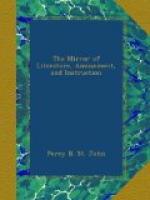In almost every Dutch town, and in every considerable village, the following custom prevails:—At a little after two o’clock in the morning of Christmas-day, a number of young men assemble in the market-place, and sing some verses suited to the occasion. One of the young men bears an artificial star, which is fixed to a pole, and elevated above the heads of the people; it is very large, and is rendered beautifully transparent when a light is placed in the inside. This artificial luminary is intended to represent the star of the east, which directed the wise men to Bethlehem, the birthplace of Christ. At a little distance, the appearance is exceedingly brilliant, for there is no other light among the populace to diminish its lustre, and the whole scene is singularly picturesque. The resplendent light issuing from the star strikes powerfully upon the countenances of the principal actors, while those more remote receive only a faint and subdued gleam. The silvery effulgence of the moon, the sombre and deserted look of the buildings around, and the general stillness that pervades every object, save the scene of action, might inspire the mind of a Rembrandt, or introduce to the mere casual beholder feelings at once new and poetical.
After parading through the town, the youths repair in a body to the residence of some opulent inhabitant, where their arrival is welcomed with shouts and clapping of hands, and where they are entertained with a plentiful repast.
G.W.N.
* * * * *
THE JEWS.
Their present actual numbers may, perhaps, not exceed six millions—numbers, however, probably greater than those over which Solomon reigned; and of these six millions there may be resident in the contiguous countries of Moravia, Ancient Poland, the Crimea, Moldavia, and Wallachia, above three millions. Except within the countries which formed Poland before its partitions, their population contained in any one European kingdom, cannot, therefore, be great. Yet so essentially are they one people, we might almost say one family; and so disposable is their wealth, as mainly vested in money transactions, that they must be considered as an aggregate, and not in their individual portions.
The Jews in France are perhaps from thirty to forty thousand; they abound chiefly at Metz, along the Rhine, and at Marseilles and Bordeaux. In Bonaparte’s time they were imagined to amount to at least twice that number.—They are relieved from civil restraints and disabilities in France, and in the Netherlands also. The Jews in Holland, of both German and Portuguese origin, are numerous; the latter are said to have taken refuge there when the United Provinces asserted their independence of Spain; they have a splendid synagogue at Amsterdam. Infidelity is supposed to have made more progress amongst them than amongst the German Jews in Holland. The




